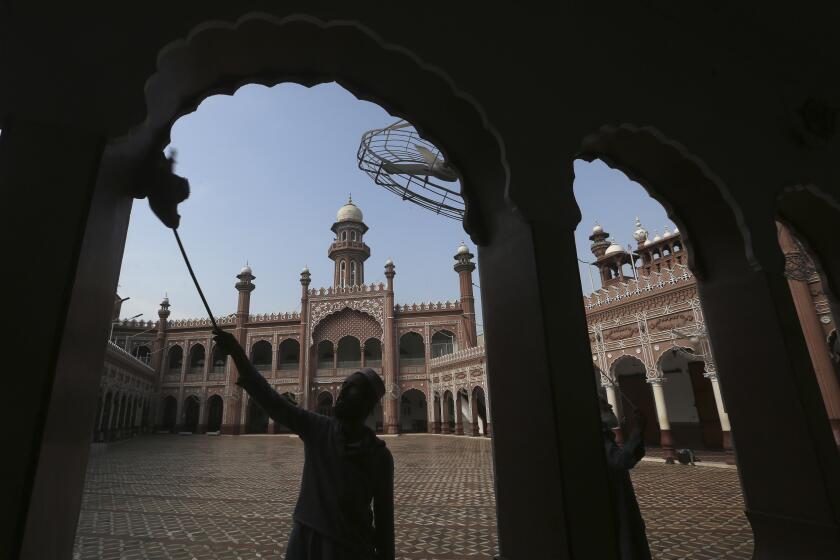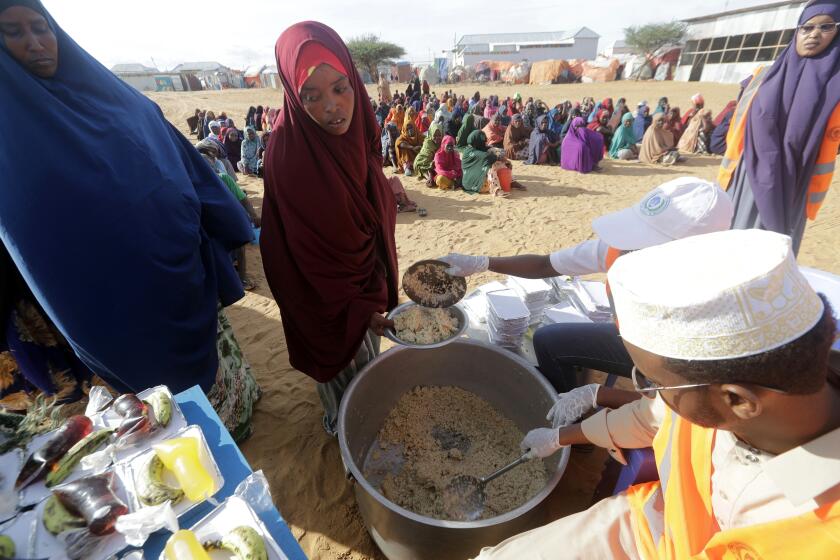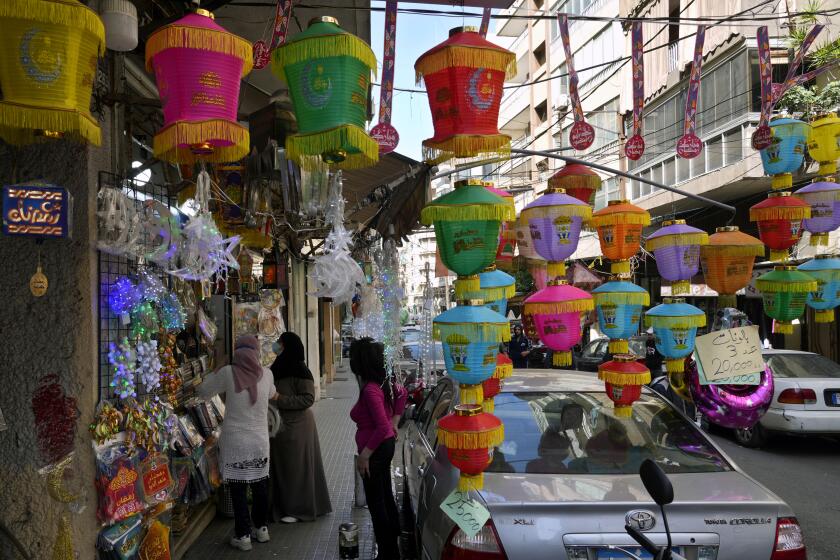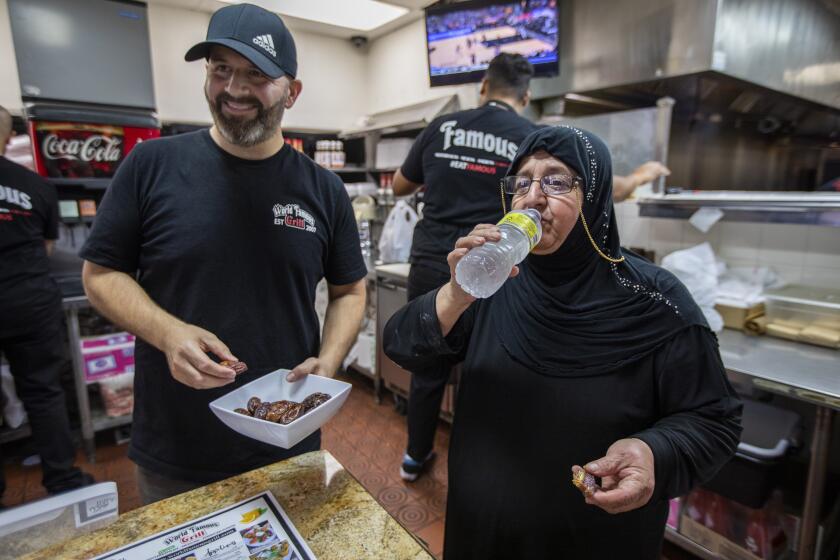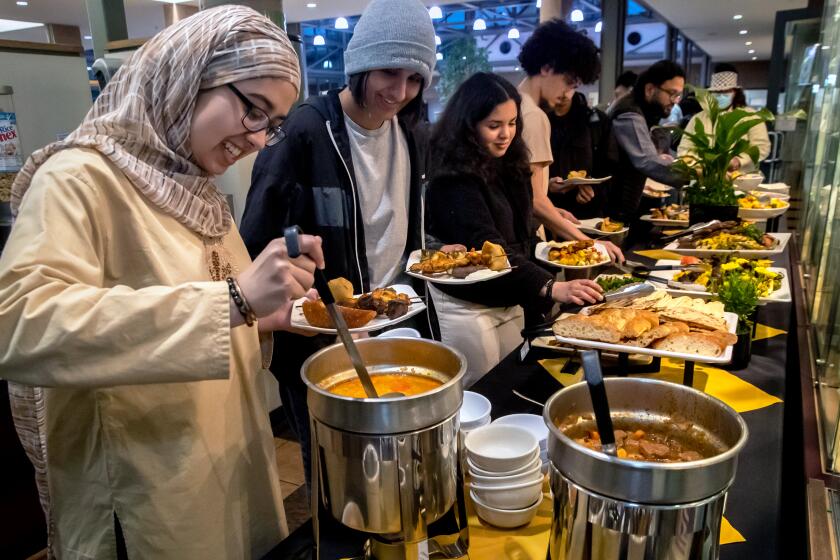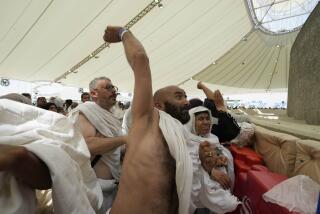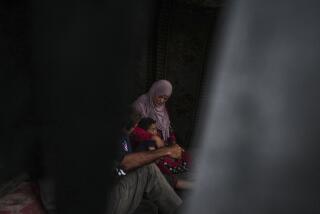Muslims celebrate end of Ramadan with feasts, prayers
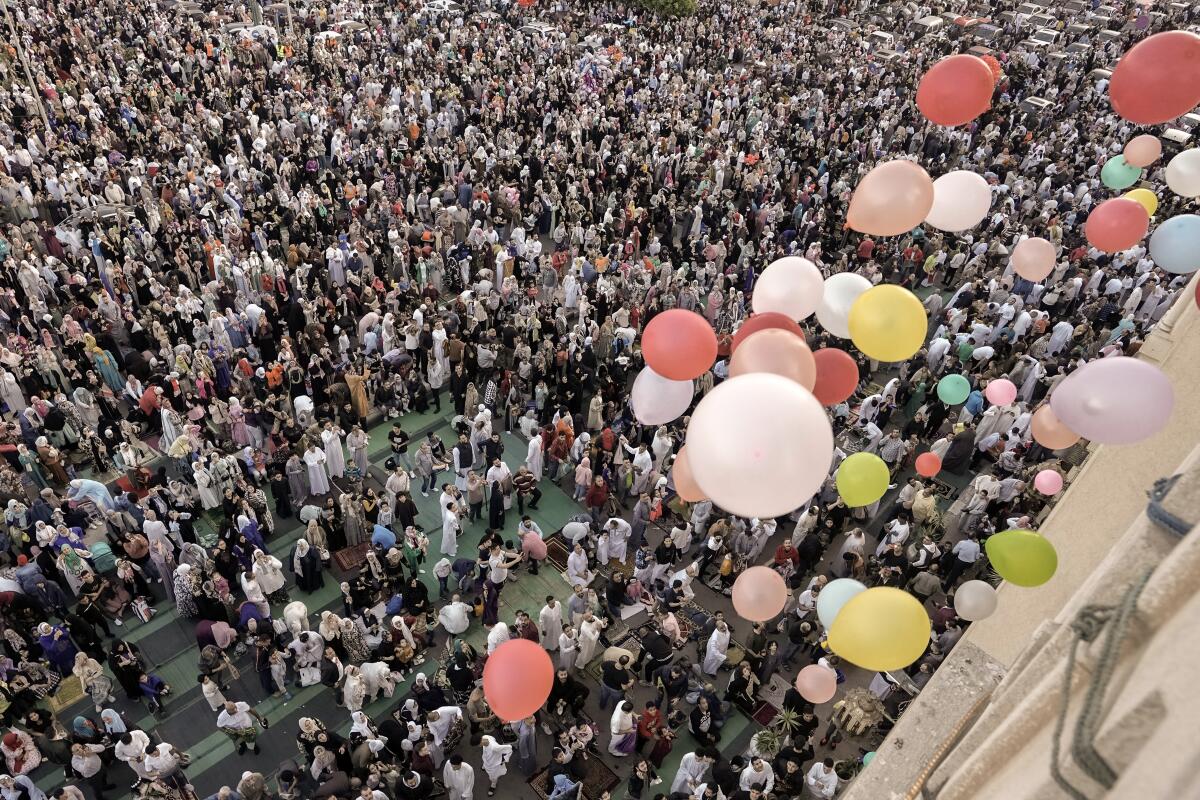
- Share via
BEIRUT — The holiday of Eid al-Fitr ushered in a day of prayers and joy for Muslims around the world on Friday.
After the Ramadan month of fasting, Muslims celebrate Eid al-Fitr with feasts and family visits. The start of the holiday is traditionally based on sightings of the new moon, which vary according to geographic location.
In Jerusalem, thousands of faithful gathered at Islam’s third holiest shrine, the Al-Aqsa Mosque compound, where tensions with Israeli authorities have seethed in the past month. The compound also hosts Judaism’s holiest site.
Following holiday prayers, a clown entertained children and a woman painted the cheek of a girl with the green, red, black and white Palestinian flag. Some attendees trampled on an Israeli flag and unfurled banners in support of Palestinian militant groups.
As Muslims observe the holy month for the next 30 days, many will struggle to afford treats amid soaring prices and economic crises.
The streets of Arab capitals of Damascus, Baghdad and Beirut were crowded with worshipers heading to mosques and cemeteries. Many Muslims visit the graves of their loved ones after the early morning prayer on the first day of Eid al-Fitr. Visitors toted bouquets of flowers, jugs of water for plants, and brooms to clean gravestones.
“After the Eid prayer we always visit our dead … to pray and pay our respects, may God have mercy and forgive them on this blessed day,” said Atheer Mohamed in Baghdad’s Azamiya cemetery.
Islam’s holidays follow a lunar calendar. But some countries rely on astronomical calculations rather than physical sightings. This frequently leads to disagreements between religious authorities in different countries — and sometimes in the same country — over the start date of Eid al-Fitr.
This year, Saudi Arabia and many other Arab countries began their Eid celebrations on Friday, while Iran, Pakistan and Indonesia, among others, set the first day of the holiday for Saturday.
The holy month of Ramadan coincides with the longest drought on record in Somalia, leaving many Muslims struggling to break their fasts.
In Sudan, the holiday was eclipsed by a week of raging battles between the army and its rival paramilitary force, which are locked in a violent struggle to control the country. The fighting has killed hundreds of people and wounded thousands.
In a video message released early Friday, his first speech since the fighting broke out, Sudan’s top general Gen. Abdel-Fattah Burhan marked the somber tone of the holiday. “Ruin and destruction and the sound of bullets have left no place for the happiness everyone in our beloved country deserves,” he said.
The day before, Sudan’s military ruled out negotiations with the rival paramilitary force, known as the Rapid Support Forces, saying it would only accept its surrender as the two sides continued to battle in central Khartoum and other parts of the country, threatening to wreck international attempts to broker a sustainable cease-fire.
Yet in other parts of the region, the recent rapprochement between archrivals Saudi Arabia and Iran has kindled hopes for peace.
In Yemen, the Saudi-Iranian rapprochement raised the possibility for an end to the civil war that had turned into a proxy conflict and torn the impoverished country apart since 2014.
Saudi officials and Iran-backed Houthi rebels recently began talks in Yemen’s capital of Sanaa. During the last days of Ramadan, the warring sides exchanged hundreds of prisoners captured during the conflict.
Food plays a central role in the Islamic holy month of Ramadan. For Muslims grappling with eating disorders, navigating those religious and social rituals can be challenging.
However, the moment of hopes was marred by a stampede late Wednesday at a charitable event in the rebel-held capital that killed at least 78 people and injured 77.
This year’s Eid al-Fitr also came on the heels of intensified violence in Israel and Palestine.
Alaa Abu Hatab and his only remaining daughter started the holiday in the Palestinian Gaza Strip by visiting the graves of his wife and four children who were killed in an Israeli airstrike on the day of Eid al-Fitr in 2021. That strike also killed Abu Hatab’s sister and her children.
“Because they were killed in the Eid, I miss them especially during Eid al-Fitr. I miss their laughter,” Abu Hatab said, standing by his family’s grave with his 6-year-old daughter, Maria. The holiday has become a “scene of pain and loss,” he said.
In Afghanistan’s Kabul, where worshipers gathered under the watchful eyes of its Taliban rulers, 35-year-old Abdul Matin said, “I wish that besides security we had good income and good jobs. Unfortunately people can’t afford to buy all their necessities at this difficult time.”
For non-Muslims, the idea of a fasting for a month while working around food might seem torturous. At this Bell restaurant, the workers are unfazed.
In Turkey and Syria, many are still mourning loved ones lost in the devastating magnitude 7.8 earthquake that struck the two countries on Feb. 6, killing more than 50,000 people.
Turkish President Recep Tayyip Erdogan on Friday performed morning Eid prayers at Hagia Sophia, the 6th century Byzantine church in Istanbul that was turned into a mosque in the 15th century. It became a museum in 1934 and was reconverted into a mosque three years ago.
Erdogan, who is facing elections next month amid an economic crisis and the fallout of the earthquake, handed out chocolate and pastries to journalists outside the mosque, renamed Holy Ayasofya Grand Mosque.
In the United States, celebrations among the Sudanese community were tempered with concern for the homeland. They still gathered in large numbers for Friday prayers at the Muslim Community Center in Silver Spring, Md.
“We are not in a mood to do anything joyful, but we’re doing [these celebrations] for the kids,” said Shaza Ahmed, who is among an estimated 20,000 Sudanese in Maryland and Virginia.
‘Ramadan is not just about staying hungry and breaking your fast, but it’s also about being together with your community,’ one student said.
In Tennessee, where school state testing was underway, Imam Ossama Bahloul, the resident scholar at the Islamic Center of Nashville, said that for the first time, his daughter missed the holiday prayer with the family so she could take an exam.
In Minneapolis, Friday public school classes were called off for the first time to mark the holiday. About 10% of students are Muslim, said Jaylani Hussein, director of Council on American-Islamic Relations-Minnesota.
“In Minneapolis, you can be unapologetically Muslim,” Hussein said.
In Dearborn, Mich., employees have Eid al-Fitr off as a paid holiday for the first time. Mayor Abdullah Hammoud said the precedent was not planned but that it was important for Muslim employees “to feel included and enjoy the holiday with their families.”
___
Associated Press reporters Ali Abdul-Hassan in Baghdad, Tia Goldenburg in Jerusalem, Fares Akram in Gaza City, Gaza Strip; Mariam Fam in Cairo, Rahim Faiez in Kabul, Afghanistan; Andrew Wilks in Istanbul, Deepa Bharath in Los Angeles, Giovanna Dell’Orto in Minneapolis and Mike Householder in Detroit contributed to this report.
More to Read
Sign up for Essential California
The most important California stories and recommendations in your inbox every morning.
You may occasionally receive promotional content from the Los Angeles Times.
